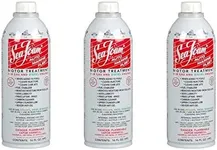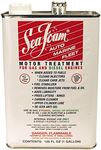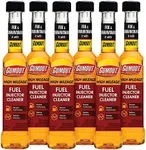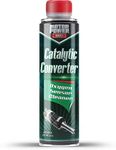Buying Guide for the Best Engine Additives
Choosing the right engine additive can significantly enhance the performance and longevity of your vehicle's engine. Engine additives are chemical compounds that you add to your engine oil or fuel to improve various aspects of engine performance, such as reducing wear, cleaning deposits, and improving fuel efficiency. To make an informed decision, it's important to understand the key specifications and how they align with your vehicle's needs and your driving habits.Type of AdditiveEngine additives come in various types, each designed to address specific issues. Common types include fuel system cleaners, oil stabilizers, friction modifiers, and coolant additives. Understanding the type of additive you need is crucial because using the wrong one can be ineffective or even harmful. For example, if your engine is experiencing knocking or pinging, a fuel system cleaner might be the right choice. If you're looking to reduce engine wear, an oil stabilizer could be more appropriate. Assess your engine's current condition and performance issues to determine the right type of additive.
CompatibilityCompatibility refers to whether the additive is suitable for your specific engine type and the fluids you are using. This is important because using an incompatible additive can cause damage or reduce the effectiveness of your engine oil or fuel. Additives are often formulated for specific types of engines, such as gasoline or diesel, and for specific types of oil, such as synthetic or conventional. Always check the product label to ensure the additive is compatible with your vehicle's engine and the fluids you are using.
Concentration and DosageConcentration and dosage refer to the amount of additive you need to use for it to be effective. This is important because using too little may not provide the desired benefits, while using too much can cause harm to your engine. Additives come with specific instructions on how much to use based on the volume of oil or fuel in your engine. Follow these instructions carefully to ensure optimal performance. If you're unsure, it's always a good idea to consult your vehicle's manual or a professional mechanic.
Performance ClaimsPerformance claims are the benefits that the additive promises to deliver, such as improved fuel efficiency, reduced emissions, or enhanced engine cleanliness. These claims are important because they help you understand what you can expect from the product. However, it's essential to be cautious and look for additives that have been tested and verified by reputable organizations. Reading reviews and seeking recommendations can also help you gauge the reliability of these claims. Choose an additive that addresses your specific needs and has a proven track record.
Brand ReputationBrand reputation refers to the trustworthiness and reliability of the manufacturer. This is important because reputable brands are more likely to produce high-quality, effective additives. A well-known brand with positive reviews and a history of satisfied customers is generally a safer choice. Research the brand, read customer reviews, and consider the company's experience in the automotive industry. Opting for a reputable brand can give you confidence in the additive's performance and safety.





















